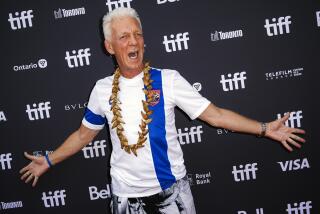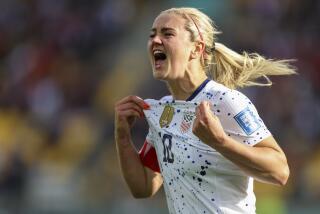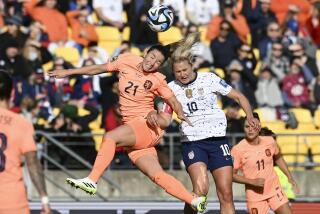WORLD CUP ’90 : West Germany Takes No Chances, Ousts Dutch, 2-1 : Soccer: Bridesmaid in last two World Cups beats archrival, avenges defeat in 1988 European Championships.
MILAN, Italy — Angered by destiny’s whims, the members of West Germany’s soccer team decided that if they are to win the World Cup, they must wrest it to their hearts and hold tight.
The Germans began to pull hard when they went undefeated (2-0-1) to win Group A in the first round. They gave another mighty tug Sunday, defeating archrival the Netherlands, 2-1, thus putting behind them their most serious obstacle to the final.
It is etched in the memory of every German soccer fan that winning matches might come easily to their team, but winning the big games does not. West Germany has won the world championship twice, the last time in 1974. They have been in the semifinals seven times and in the final five times.
No other team has been so close so many times and not won. The disappointment has been bitter; West Germany has been runner-up in the last two World Cups, losing to Italy in 1982 and to Argentina in 1986.
In eliminating the Dutch, one of the favorites to win, the Germans also banished the memory of their loss to the Dutch in the 1988 European Championships. Sunday’s game was not without its revenge factor and further fueled the sporting enmity between the two countries.
The ouster of the Dutch should have been a surprise, but was not. The team has been a disappointment in this tournament, getting no help from star players Ruud Gullit and Marco van Basten.
After the game, West German Coach Franz Beckenbauer all but claimed his team’s right to the championship.
“Why should we not become the world champions? I don’t think there is a better team here,” he said.
Germany will play Czechoslovakia in the quarterfinals in Milan July 1.
Sunday’s game turned on the expulsion of a key player from each team. The incidents--which escalated from yellow cards to red cards--reflected the acrimony that was the undercurrent to the match.
That acrimony was not limited to the field. The Dutch and German fans have earned a reputation for rowdy behavior in the tournament, and the 74,559 fans in Giuseppe Meazza Stadium at times appeared on the verge of frenzy.
That comes close to describing an incident early in the first half. It began when Dutch defender Frank Rijkaard tackled striker Rudolf Voeller from behind barely outside the Dutch area, a so-called “professional foul.” Rijkaard got a caution for the foul in the 20th minute, and the teams began to set up for a free kick.
Rijkaard jogged by Voeller and spit at him, apparently unseen by the referee. What referee Juan Loustau did see was Voeller reacting rather violently, shouting in Rijkaard’s face. Voeller was given a yellow card in the 21st minute.
Germany’s free kick was lofted toward the goal and Voeller followed it into the goalmouth, where goalkeeper Hans van Breukelen smothered the ball. Voeller charged hard and hurdled van Breukelen.
That seemingly provoked the goalkeeper, who, along with Rijkaard, exchanged words with Voeller. Voeller was incensed, and had to be restrained by teammate Juergen Klinsmann.
Both Voeller and Rijkaard were given their second cautions of the match, and automatic expulsion.
Suddenly, after only 22 minutes, each team was a man short. How well each team coped with the loss set the tone for the rest of the match.
The Germans, minus a key striker, sent more players up to bolster their attack. The Dutch, minus the player who had successfully contained Klinsmann, struggled to find the confidence they had shown earlier.
Said Dutch Coach Leo Beenhakker of his team’s play after the expulsions: “Some of my players lost their heads.”
The Dutch certainly lost their poise. Their precise, patient game of short touch passes and set plays broke down. All of their highly regarded technical players were reduced to chasing errant passes and sending panicked shots wide or high.
The Germans, on the other hand, collected themselves and settled into a dump-and-chase offense that freed Klinsmann time and again. The strategy was as simple as it was effective: instead of launching a counterattack on the ground, send the ball long to Klinsmann and hope he outruns the Dutch defense.
He did, most of the time. Credit van Breukelen for making point-blank saves late in the game. Once Rijkaard went out of the game, Andrie van Tiggelen was shifted to mark Klinsmann. The Dutch defender simply was not fast enough.
It was Klinsmann whose goal broke a scoreless tie in the second half. His diving, left-footed shot in the 49th minute merely punctuated Germany’s already obvious superiority.
Defenseman Andreas Brehme lofted a kick high into the right corner of the net in the 84th minute to give Germany a 2-0 lead.
The Netherlands scored on Ronald Koeman’s penalty kick in the 88th minute to close the scoring.








